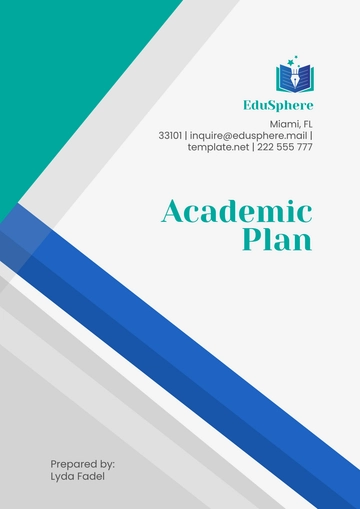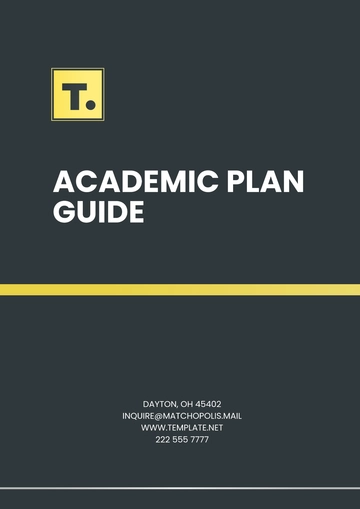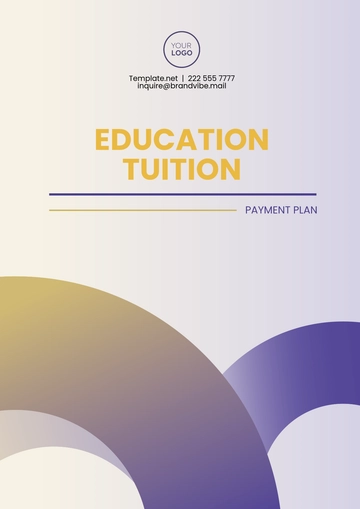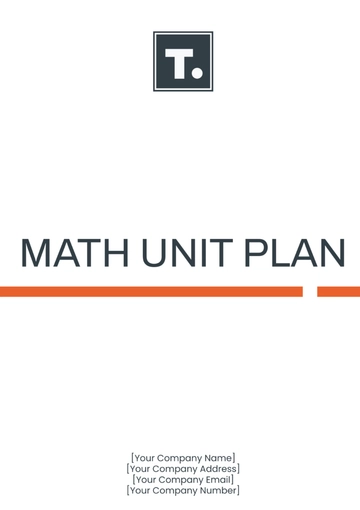Free Study Course Plan

Course Title: | Introduction to Data Science |
|---|---|
Course Code: | DS101 |
Instructor: | [YOUR NAME] |
Institution: | [YOUR COMPANY NAME] |
Semester: | Fall 2055 |
Course Description
This course provides an introduction to the fundamental concepts and techniques in data science. It covers the entire data science pipeline, from data collection and cleaning to analysis, visualization, and modeling. Students will learn how to apply statistical techniques, machine learning algorithms, and data visualization tools to solve real-world problems. No prior experience in programming or statistics is required.
Course Objectives
By the end of the course, students will be able to:
Understand the basics of data science, including data collection, cleaning, and pre-processing.
Use programming languages like Python to analyze data.
Apply fundamental statistical techniques for data analysis.
Understand machine learning models and how to implement them.
Present data findings using visualization tools such as Matplotlib and Tableau.
Solve real-world problems using data-driven insights.
Prerequisites
Basic knowledge of mathematics (high school level)
Familiarity with using computers and the internet
Required Materials
Textbook: “Data Science from Scratch” by Joel Grus (3rd Edition, 2055)
Software: Python (version 4.0), Jupyter Notebooks, Tableau
Laptop with at least 8GB of RAM for running data analysis
Course Schedule
Week | Topic | Assignment/Activity | Due Date |
|---|---|---|---|
1 | Introduction to Data Science | Reading: Chapter 1, Hands-on activity | Week 2 |
2 | Data Collection and Cleaning | Homework: Data wrangling exercise | Week 3 |
3 | Introduction to Python | Python assignment #1 | Week 4 |
4 | Exploratory Data Analysis (EDA) | EDA Project | Week 5 |
5 | Data Visualization Techniques | Visualization project | Week 6 |
6 | Introduction to Machine Learning | Machine Learning assignment | Week 7 |
7 | Supervised Learning Models | Midterm Exam | Week 8 |
8 | Unsupervised Learning Models | Project work | Week 9 |
9 | Model Evaluation and Tuning | Final project preparation | Week 10 |
10 | Final Project Presentations | Submission of final project | Week 11 |
Grading Criteria
Category | Percentage |
|---|---|
Assignments (5) | 30% |
Midterm Exam | 20% |
Final Project | 30% |
Class Participation | 10% |
Attendance | 10% |
Grading Scale:
A: 90-100%
B: 80-89%
C: 70-79%
D: 60-69%
F: Below 60%
Course Policies
Attendance: Regular attendance is mandatory. Absences must be communicated in advance.
Late Assignments: Assignments submitted after the due date will incur a 10% deduction per day.
Academic Integrity: All students are expected to uphold the highest standards of academic honesty. Plagiarism and cheating will result in disciplinary action.
Office Hours: Available by appointment on weekdays from 2:00 PM to 4:00 PM via Zoom.
Additional Resources
Online Platform: All course materials, announcements, and assignments will be available on the [YOUR COMPANY NAME] learning management system.
Tutoring: Additional help sessions will be available upon request.
Course Outline
Introduction to Data Science and the Data Pipeline
Overview of data science and its applications in various industries. Understanding the data science workflow.Data Collection and Preprocessing
Techniques for collecting raw data and cleaning it for analysis.Python for Data Science
Hands-on programming sessions with Python, covering basic syntax, data types, and libraries such as NumPy and Pandas.Exploratory Data Analysis (EDA)
Learning how to explore and summarize data. Introduction to statistical summaries and visualizations.Data Visualization
Creating informative and aesthetically pleasing visualizations using tools like Matplotlib, Seaborn, and Tableau.Introduction to Machine Learning
Introduction to machine learning concepts, focusing on supervised and unsupervised learning.Supervised Learning
In-depth study of classification and regression models, such as decision trees and linear regression.Unsupervised Learning
Exploring clustering algorithms such as K-Means and dimensionality reduction techniques like PCA.Model Evaluation
Understanding techniques for evaluating model performance, including cross-validation and confusion matrices.Final Project
Students will apply all the skills learned in the course to a real-world data problem and present their findings.
- 100% Customizable, free editor
- Access 1 Million+ Templates, photo’s & graphics
- Download or share as a template
- Click and replace photos, graphics, text, backgrounds
- Resize, crop, AI write & more
- Access advanced editor
Optimize your academic planning with Template.net’s Study Course Plan Template. This customizable template offers a comprehensive structure for outlining course objectives, schedules, and assessment methods. Fully editable in our Ai Editor Tool, it enables educators to modify content according to their course requirements and student needs. Get this template now!
You may also like
- Finance Plan
- Construction Plan
- Sales Plan
- Development Plan
- Career Plan
- Budget Plan
- HR Plan
- Education Plan
- Transition Plan
- Work Plan
- Training Plan
- Communication Plan
- Operation Plan
- Health And Safety Plan
- Strategy Plan
- Professional Development Plan
- Advertising Plan
- Risk Management Plan
- Restaurant Plan
- School Plan
- Nursing Home Patient Care Plan
- Nursing Care Plan
- Plan Event
- Startup Plan
- Social Media Plan
- Staffing Plan
- Annual Plan
- Content Plan
- Payment Plan
- Implementation Plan
- Hotel Plan
- Workout Plan
- Accounting Plan
- Campaign Plan
- Essay Plan
- 30 60 90 Day Plan
- Research Plan
- Recruitment Plan
- 90 Day Plan
- Quarterly Plan
- Emergency Plan
- 5 Year Plan
- Gym Plan
- Personal Plan
- IT and Software Plan
- Treatment Plan
- Real Estate Plan
- Law Firm Plan
- Healthcare Plan
- Improvement Plan
- Media Plan
- 5 Year Business Plan
- Learning Plan
- Marketing Campaign Plan
- Travel Agency Plan
- Cleaning Services Plan
- Interior Design Plan
- Performance Plan
- PR Plan
- Birth Plan
- Life Plan
- SEO Plan
- Disaster Recovery Plan
- Continuity Plan
- Launch Plan
- Legal Plan
- Behavior Plan
- Performance Improvement Plan
- Salon Plan
- Security Plan
- Security Management Plan
- Employee Development Plan
- Quality Plan
- Service Improvement Plan
- Growth Plan
- Incident Response Plan
- Basketball Plan
- Emergency Action Plan
- Product Launch Plan
- Spa Plan
- Employee Training Plan
- Data Analysis Plan
- Employee Action Plan
- Territory Plan
- Audit Plan
- Classroom Plan
- Activity Plan
- Parenting Plan
- Care Plan
- Project Execution Plan
- Exercise Plan
- Internship Plan
- Software Development Plan
- Continuous Improvement Plan
- Leave Plan
- 90 Day Sales Plan
- Advertising Agency Plan
- Employee Transition Plan
- Smart Action Plan
- Workplace Safety Plan
- Behavior Change Plan
- Contingency Plan
- Continuity of Operations Plan
- Health Plan
- Quality Control Plan
- Self Plan
- Sports Development Plan
- Change Management Plan
- Ecommerce Plan
- Personal Financial Plan
- Process Improvement Plan
- 30-60-90 Day Sales Plan
- Crisis Management Plan
- Engagement Plan
- Execution Plan
- Pandemic Plan
- Quality Assurance Plan
- Service Continuity Plan
- Agile Project Plan
- Fundraising Plan
- Job Transition Plan
- Asset Maintenance Plan
- Maintenance Plan
- Software Test Plan
- Staff Training and Development Plan
- 3 Year Plan
- Brand Activation Plan
- Release Plan
- Resource Plan
- Risk Mitigation Plan
- Teacher Plan
- 30 60 90 Day Plan for New Manager
- Food Safety Plan
- Food Truck Plan
- Hiring Plan
- Quality Management Plan
- Wellness Plan
- Behavior Intervention Plan
- Bonus Plan
- Investment Plan
- Maternity Leave Plan
- Pandemic Response Plan
- Succession Planning
- Coaching Plan
- Configuration Management Plan
- Remote Work Plan
- Self Care Plan
- Teaching Plan
- 100-Day Plan
- HACCP Plan
- Student Plan
- Sustainability Plan
- 30 60 90 Day Plan for Interview
- Access Plan
- Site Specific Safety Plan





























